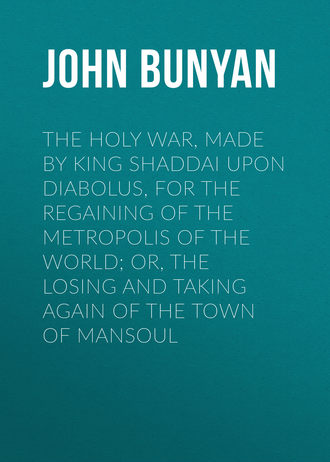 полная версия
полная версияThe Holy War, Made by King Shaddai Upon Diabolus, for the Regaining of the Metropolis of the World; Or, The Losing and Taking Again of the Town of Mansoul
Now all this time the good King, the King Shaddai, was preparing to send an army to recover the town of Mansoul again from under the tyranny of their pretended king Diabolus; but he thought good, at first, not to send them by the hand and conduct of brave Emmanuel his Son, but under the hand of some of his servants, to see first by them the temper of Mansoul, and whether by them they would be won to the obedience of their King. The army consisted of above forty thousand, all true men, for they came from the King’s own court, and were those of his own choosing.
They came up to Mansoul under the conduct of four stout generals, each man being a captain of ten thousand men, and these are their names and their ensigns. The name of the first was Boanerges, the name of the second was Captain Conviction, the name of the third was Captain Judgment, and the name of the fourth was Captain Execution. These were the captains that Shaddai sent to regain Mansoul.
These four captains, as was said, the King thought fit, in the first place, to send to Mansoul, to make an attempt upon it; for indeed generally in all his wars he did use to send these four captains in the van, for they were very stout and rough-hewn men, men that were fit to break the ice, and to make their way by dint of sword, and their men were like themselves.
To each of these captains the King gave a banner, that it might be displayed, because of the goodness of his cause, and because of the right that he had to Mansoul.
First, to Captain Boanerges, for he was the chief, to him, I say, were given ten thousand men. His ensign was Mr. Thunder; he bare the black colours, and his scutcheon was the three burning thunderbolts.
The second captain was Captain Conviction; to him also were given ten thousand men. His ensign’s name was Mr. Sorrow; he did bear the pale colours, and his scutcheon was the book of the law wide open, from whence issued a flame of fire.
The third captain was Captain Judgment; to him were given ten thousand men. His ensign’s name was Mr. Terror; he bare the red colours, and his scutcheon was a burning fiery furnace.
The fourth captain was Captain Execution; to him were given ten thousand men. His ensign was one Mr. Justice; he also bare the red colours, and his scutcheon was a fruitless tree, with an axe lying at the root thereof.
These four captains, as I said, had every one of them under his command ten thousand men, all of good fidelity to the King, and stout at their military actions.
Well, the captains and their forces, their men and under officers, being had upon a day by Shaddai into the field, and there called all over by their names, were then and there put into such harness as became their degree and that service which now they were going about for their King.
Now, when the King had mustered his forces, (for it is he that mustereth the host to the battle,) he gave unto the captains their several commissions, with charge and commandment in the audience of all the soldiers, that they should take heed faithfully and courageously to do and execute the same. Their commissions were, for the substance of them, the same in form, though, as to name, title, place and degree of the captains, there might be some, but very small variation. And here let me give you an account of the matter and sum contained in their commission.
A Commission from the great Shaddai, King of Mansoul, to his trusty and noble Captain, the Captain Boanerges, for his making War upon the town of Mansoul.
‘O, thou Boanerges, one of my stout and thundering captains over one ten thousand of my valiant and faithful servants, go thou in my name, with this thy force, to the miserable town of Mansoul; and when thou comest thither, offer them first conditions of peace; and command them that, casting off the yoke and tyranny of the wicked Diabolus, they return to me, their rightful Prince and Lord. Command them also that they cleanse themselves from all that is his in the town of Mansoul, and look to thyself, that thou hast good satisfaction touching the truth of their obedience. Thus when thou hast commanded them, (if they in truth submit thereto,) then do thou, to the uttermost of thy power, what in thee lies to set up for me a garrison in the famous town of Mansoul; nor do thou hurt the least native that moveth or breatheth therein, if they will submit themselves to me, but treat thou such as if they were thy friend or brother; for all such I love, and they shall be dear unto me, and tell them that I will take a time to come unto them, and to let them know that I am merciful.
‘But if they shall, notwithstanding thy summons and the producing of thy authority, resist, stand out against thee, and rebel, then do I command thee to make use of all thy cunning, power, might, and force, to bring them under by strength of hand. Farewell.’
Thus you see the sum of their commissions; for, as I said before, for the substance of them, they were the same that the rest of the noble captains had.
Wherefore they, having received each commander his authority at the hand of their King, the day being appointed, and the place of their rendezvous prefixed, each commander appeared in such gallantry as became his cause and calling. So, after a new entertainment from Shaddai, with flying colours they set forward to march towards the famous town of Mansoul. Captain Boanerges led the van, Captain Conviction and Captain Judgment made up the main body, and Captain Execution brought up the rear. They then, having a great way to go, (for the town of Mansoul was far off from the court of Shaddai,) marched through the regions and countries of many people, not hurting or abusing any, but blessing wherever they came. They also lived upon the King’s cost in all the way they went.
Having travelled thus for many days, at last they came within sight of Mansoul; the which when they saw, the captains could for their hearts do no less than for a while bewail the condition of the town; for they quickly saw how that it was prostrate to the will of Diabolus, and to his ways and designs.
Well, to be short, the captains came up before the town, march up to Ear-gate, sit down there (for that was the place of hearing). So, when they had pitched their tents and entrenched themselves, they addressed themselves to make their assault.
Now the townsfolk at first, beholding so gallant a company, so bravely accoutred, and so excellently disciplined, having on their glittering armour, and displaying of their flying colours, could not but come out of their houses and gaze. But the cunning fox Diabolus, fearing that the people, after this sight, should, on a sudden summons, open the gates to the captains, came down with all haste from the castle, and made them retire into the body of the town, who, when he had them there, made this lying and deceivable speech unto them:
‘Gentlemen,’ quoth he, ‘although you are my trusty and well-beloved friends, yet I cannot but a little chide you for your late uncircumspect action, in going out to gaze on that great and mighty force that but yesterday sat down before, and have now entrenched themselves in order to the maintaining of a siege against the famous town of Mansoul. Do you know who they are, whence they come, and what is their purpose in sitting down before the town of Mansoul? They are they of whom I have told you long ago, that they would come to destroy this town, and against whom I have been at the cost to arm you with cap-a-pie for your body, besides great fortifications for your mind. Wherefore, then, did you not rather, even at the first appearance of them, cry out, “Fire the beacons!” and give the whole town an alarm concerning them, that we might all have been in a posture of defence, and been ready to have received them with the highest acts of defiance? Then had you showed yourselves men to my liking; whereas, by what you have done, you have made me half afraid—I say, half afraid—that when they and we shall come to push a pike, I shall find you want courage to stand it out any longer. Wherefore have I commanded a watch, and that you should double your guards at the gates? Wherefore have I endeavoured to make you as hard as iron, and your hearts as a piece of the nether millstone? Was it, think you, that you might show yourselves women, and that you might go out like a company of innocents to gaze on your mortal foes? Fie, fie! put yourselves into a posture of defence, beat up the drum, gather together in warlike manner, that our foes may know that, before they shall conquer this corporation, there are valiant men in the town of Mansoul.
‘I will leave off now to chide, and will not further rebuke you; but I charge you, that henceforwards you let me see no more such actions. Let not henceforward a man of you, without order first obtained from me, so much as show his head over the wall of the town of Mansoul. You have now heard me; do as I have commanded, and you shall cause me that I dwell securely with you, and that I take care, as for myself, so for your safety and honour also. Farewell.’
Now were the townsmen strangely altered; they were as men stricken with a panic fear; they ran to and fro through the streets of the town of Mansoul, crying out, ‘Help, help! the men that turn the world upside down are come hither also.’ Nor could any of them be quiet after; but still, as men bereft of wit, they cried out, ‘The destroyers of our peace and people are come.’ This went down with Diabolus. ‘Ah,’ quoth he to himself, ‘this I like well: now it is as I would have it; now you show your obedience to your prince. Hold you but here, and then let them take the town if they can.’
Well, before the King’s forces had sat before Mansoul three days, Captain Boanerges commanded his trumpeter to go down to Ear-gate, and there, in the name of the great Shaddai, to summon Mansoul to give audience to the message that he, in his Master’s name, was to them commanded to deliver. So the trumpeter, whose name was Take-heed-what-you-hear, went up, as he was commanded, to Ear-gate, and there sounded his trumpet for a hearing; but there was none that appeared that gave answer or regard, for so had Diabolus commanded. So the trumpeter returned to his captain, and told him what he had done, and also how he had sped; whereat the captain was grieved, but bid the trumpeter go to his tent.
Again Captain Boanerges sendeth his trumpeter to Ear-gate, to sound as before for a hearing; but they again kept close, came not out, nor would they give him an answer, so observant were they of the command of Diabolus their king.
Then the captains and other field officers called a council of war, to consider what further was to be done for the gaining of the town of Mansoul; and, after some close and thorough debate upon the contents of their commissions, they concluded yet to give to the town, by the hand of the fore-named trumpeter, another summons to hear; but if that shall be refused, said they, and that the town shall stand it out still, then they determined, and bid the trumpeter tell them so, that they would endeavour, by what means they could, to compel them by force to the obedience of their King.
So Captain Boanerges commanded his trumpeter to go up to Ear-gate again, and, in the name of the great King Shaddai, to give it a very loud summons to come down without delay to Ear-gate, there to give audience to the King’s most noble captains. So the trumpeter went, and did as he was commanded: he went up to Ear-gate, and sounded his trumpet, and gave a third summons to Mansoul. He said, moreover, that if this they should still refuse to do, the captains of his prince would with might come down upon them, and endeavour to reduce them to their obedience by force.
Then stood up my Lord Willbewill, who was the governor of the town, (this Willbewill was that apostate of whom mention was made before,) and the keeper of the gates of Mansoul. He therefore, with big and ruffling words, demanded of the trumpeter who he was, whence he came, and what was the cause of his making so hideous a noise at the gate, and speaking such insufferable words against the town of Mansoul.
The trumpeter answered, ‘I am servant to the most noble captain, Captain Boanerges, general of the forces of the great King Shaddai, against whom both thyself, with the whole town of Mansoul, have rebelled, and lift up the heel; and my master, the captain, hath a special message to this town, and to thee, as a member thereof; the which if you of Mansoul shall peaceably hear, so; and if not, you must take what follows.’
Then said the Lord Willbewill, ‘I will carry thy words to my lord, and will know what he will say.’
But the trumpeter soon replied, saying. ‘Our message is not to the giant Diabolus, but to the miserable town of Mansoul; nor shall we at all regard what answer by him is made, nor yet by any for him. We are sent to this town to recover it from under his cruel tyranny, and to persuade it to submit, as in former times it did, to the most excellent King Shaddai.’
Then said the Lord Willbewill, ‘I will do your errand to the town.’
The trumpeter then replied, ‘Sir, do not deceive us, lest, in so doing, you deceive yourselves much more.’ He added, moreover, ‘For we are resolved, if in peaceable manner you do not submit yourselves, then to make a war upon you, and to bring you under by force. And of the truth of what I now say, this shall be a sign unto you,—you shall see the black flag, with its hot, burning thunder-bolts, set upon the mount to-morrow, as a token of defiance against your prince, and of our resolutions to reduce you to your Lord and rightful King.’
So the said Lord Willbewill returned from off the wall, and the trumpeter came into the camp. When the trumpeter was come into the camp, the captains and officers of the mighty King Shaddai came together to know if he had obtained a hearing, and what was the effect of his errand. So the trumpeter told, saying, ‘When I had sounded my trumpet, and had called aloud to the town for a hearing, my Lord Willbewill, the governor of the town, and he that hath charge of the gates, came up when he heard me sound, and, looking over the wall, he asked me what I was, whence I came, and what was the cause of my making this noise. So I told him my errand, and by whose authority I brought it. “Then,” said he, “I will tell it to the governor and to Mansoul;” and then I returned to my lords.’
Then said the brave Boanerges, ‘Let us yet for a while lie still in our trenches, and see what these rebels will do.’
Now when the time drew nigh that audience by Mansoul must be given to the brave Boanerges and his companions, it was commanded that all the men of war throughout the whole camp of Shaddai should as one man stand to their arms, and make themselves ready, if the town of Mansoul shall hear, to receive it forthwith to mercy; but if not, to force a subjection. So the day being come, the trumpeters sounded, and that throughout the whole camp, that the men of war might be in a readiness for that which then should be the work of the day. But when they that were in the town of Mansoul heard the sound of the trumpets throughout the camp of Shaddai, and thinking no other but that it must be in order to storm the corporation, they at first were put to great consternation of spirit; but after they a little were settled again, they also made what preparation they could for a war, if they did storm; else, to secure themselves.
Well, when the utmost time was come, Boanerges was resolved to hear their answer; wherefore he sent out his trumpeter again to summon Mansoul to a hearing of the message that they had brought from Shaddai.
So he went and sounded, and the townsmen came up, but made Ear-gate as sure as they could. Now when they were come up to the top of the wall, Captain Boanerges desired to see the Lord Mayor; but my Lord Incredulity was then Lord Mayor, for he came in the room of my Lord Lustings. So Incredulity came up and showed himself over the wall; but when the Captain Boanerges had set his eyes upon him, he cried out aloud, ‘This is not he: where is my Lord Understanding, the ancient Lord Mayor of the town of Mansoul? for to him I would deliver my message.’
Then said the giant (for Diabolus was also come down) to the captain, ‘Mr. Captain, you have by your boldness given to Mansoul at least four summonses to subject herself to your King, by whose authority I know not, nor will I dispute that now. I ask, therefore, what is the reason of all this ado, or what would you be at if you knew yourselves?’
Then Captain Boanerges, whose were the black colours, and whose scutcheon was the three burning thunderbolts, taking no notice of the giant or of his speech, thus addressed himself to the town of Mansoul: ‘Be it known unto you, O unhappy and rebellious Mansoul, that the most gracious King, the great King Shaddai, my Master, hath sent me unto you with commission’ (and so he showed to the town his broad seal) ‘to reduce you to his obedience; and he hath commanded me, in case you yield upon my summons, to carry it to you as if you were my friends or brethren; but he also hath bid, that if, after summons to submit you still stand out and rebel, we should endeavour to take you by force.’
Then stood forth Captain Conviction, and said, (his were the pale colours, and for a scutcheon he had the book of the law wide open, etc.,) ‘Hear, O Mansoul! Thou, O Mansoul, wast once famous for innocency, but now thou art degenerated into lies and deceit. Thou hast heard what my brother, the Captain Boanerges, hath said; and it is your wisdom, and will be your happiness, to stoop to, and accept of conditions of peace and mercy when offered, specially when offered by one against whom thou hast rebelled, and one who is of power to tear thee in pieces, for so is Shaddai, our King; nor, when he is angry, can anything stand before him. If you say you have not sinned, or acted rebellion against our King, the whole of your doings since the day that you cast off his service (and there was the beginning of your sin) will sufficiently testify against you. What else means your hearkening to the tyrant, and your receiving him for your king? What means else your rejecting of the laws of Shaddai, and your obeying of Diabolus? Yea, what means this your taking up of arms against, and the shutting of your gates upon us, the faithful servants of your King? Be ruled then, and accept of my brother’s invitation, and overstand not the time of mercy, but agree with thine adversary quickly. Ah, Mansoul! suffer not thyself to be kept from mercy, and to be run into a thousand miseries, by the flattering wiles of Diabolus. Perhaps that piece of deceit may attempt to make you believe that we seek our own profit in this our service, but know it is obedience to our King, and love to your happiness, that is the cause of this undertaking of ours.
‘Again I say to thee, O Mansoul, consider if it be not amazing grace that Shaddai should so humble himself as he doth: now he, by us, reasons with you, in a way of entreaty and sweet persuasions, that you would subject yourselves to him. Has he that need of you that we are sure you have of him? No, no; but he is merciful, and will not that Mansoul should die, but turn to him and live.’
Then stood forth Captain Judgment, whose were the red colours, and for a scutcheon he had the burning fiery furnace, and he said, ‘O ye, the inhabitants of the town of Mansoul, that have lived so long in rebellion and acts of treason against the King Shaddai, know that we come not to-day to this place, in this manner, with our message of our own minds, or to revenge our own quarrel; it is the King, my Master, that hath sent us to reduce you to your obedience to him; the which if you refuse in a peaceable way to yield, we have commission to compel you thereto. And never think of yourselves, nor yet suffer the tyrant Diabolus to persuade you to think, that our King, by his power, is not able to bring you down, and to lay you under his feet; for he is the former of all things, and if he touches the mountains, they smoke. Nor will the gate of the King’s clemency stand always open; for the day that shall burn like an oven is before him; yea, it hasteth greatly, it slumbereth not.
‘O Mansoul, is it little in thine eyes that our King doth offer thee mercy, and that after so many provocations? Yea, he still holdeth out his golden sceptre to thee, and will not yet suffer his gate to be shut against thee: wilt thou provoke him to do it? If so, consider of what I say; to thee it is opened no more for ever. If thou sayest thou shalt not see him, yet judgment is before him; therefore trust thou in him. Yea, because there is wrath, beware lest he take thee away with his stroke; then a great ransom cannot deliver thee. Will he esteem thy riches? No, not gold, nor all the forces of strength. He hath prepared his throne for judgment, for he will come with fire, and with his chariots like a whirlwind, to render his anger with fury, and his rebukes with flames of fire. Therefore, O Mansoul, take heed lest, after thou hast fulfilled the judgment of the wicked, justice and judgment should take hold of thee.’
Now while the Captain Judgment was making this oration to the town of Mansoul, it was observed by some that Diabolus trembled; but he proceeded in his parable and said, ‘O thou woful town of Mansoul, wilt thou not yet set open thy gate to receive us, the deputies of thy King, and those that would rejoice to see thee live? Can thine heart endure, or can thy hands be strong, in the day that he shall deal in judgment with thee? I say, canst thou endure to be forced to drink, as one would drink sweet wine, the sea of wrath that our King has prepared for Diabolus and his angels? Consider, betimes consider.’
Then stood forth the fourth captain, the noble Captain Execution, and said, ‘O town of Mansoul, once famous, but now like the fruitless bough, once the delight of the high ones, but now a den for Diabolus, hearken also to me, and to the words that I shall speak to thee in the name of the great Shaddai. Behold, the axe is laid to the root of the trees: every tree, therefore, that bringeth not forth good fruit, is hewn down and cast into the fire.
‘Thou, O town of Mansoul, hast hitherto been this fruitless tree; thou bearest nought but thorns and briars. Thy evil fruit bespeaks thee not to be a good tree; thy grapes are grapes of gall, thy clusters are bitter. Thou hast rebelled against thy King; and, lo! we, the power and force of Shaddai, are the axe that is laid to thy root. What sayest thou? Wilt thou turn? I say again, tell me, before the first blow is given, wilt thou turn? Our axe must first be laid to thy root before it be laid at thy root; it must first be laid to thy root in a way of threatening, before it is laid at thy root by way of execution; and between these two is required thy repentance, and this is all the time that thou hast. What wilt thou do? Wilt thou turn, or shall I smite? If I fetch my blow, Mansoul, down you go; for I have commission to lay my axe at as well as to thy roots, nor will anything but yielding to our King prevent doing of execution. What art thou fit for, O Mansoul, if mercy preventeth not, but to be hewn down, and cast into the fire and burned?
‘O Mansoul, patience and forbearance do not act for ever: a year, or two, or three, they may; but if thou provoke by a three years’ rebellion, (and thou hast already done more than this,) then what follows but, ‘Cut it down’? nay, ‘After that thou shalt cut it down.’ And dost thou think that these are but threatenings, or that our King has not power to execute his words? O Mansoul, thou wilt find that in the words of our King, when they are by sinners made little or light of, there is not only threatening, but burning coals of fire.
‘Thou hast been a cumber-ground long already, and wilt thou continue so still? Thy sin has brought this army to thy walls, and shall it bring it in judgment to do execution into thy town? Thou hast heard what the captains have said, but as yet thou shuttest thy gates. Speak out, Mansoul; wilt thou do so still, or wilt thou accept of conditions of peace?’
These brave speeches of these four noble captains the town of Mansoul refused to hear; yet a sound thereof did beat against Ear-gate, though the force thereof could not break it open. In fine, the town desired a time to prepare their answer to these demands. The captains then told them, that if they would throw out to them one Ill-Pause that was in the town, that they might reward him according to his works, then they would give them time to consider; but if they would not cast him to them over the wall of Mansoul, then they would give them none; ‘for,’ said they, ‘we know that, so long as Ill-Pause draws breath in Mansoul, all good consideration will be confounded, and nothing but mischief will come thereon.’









